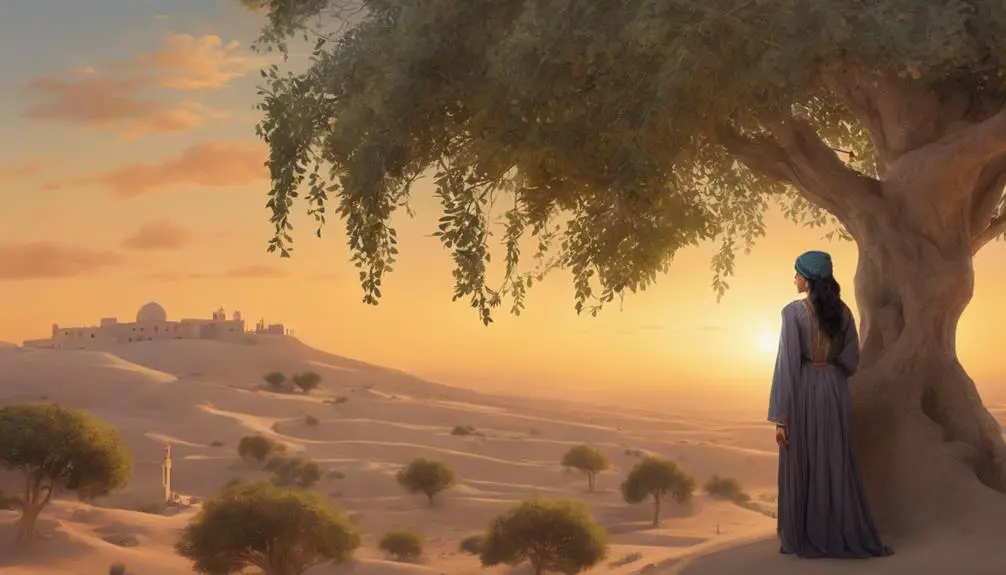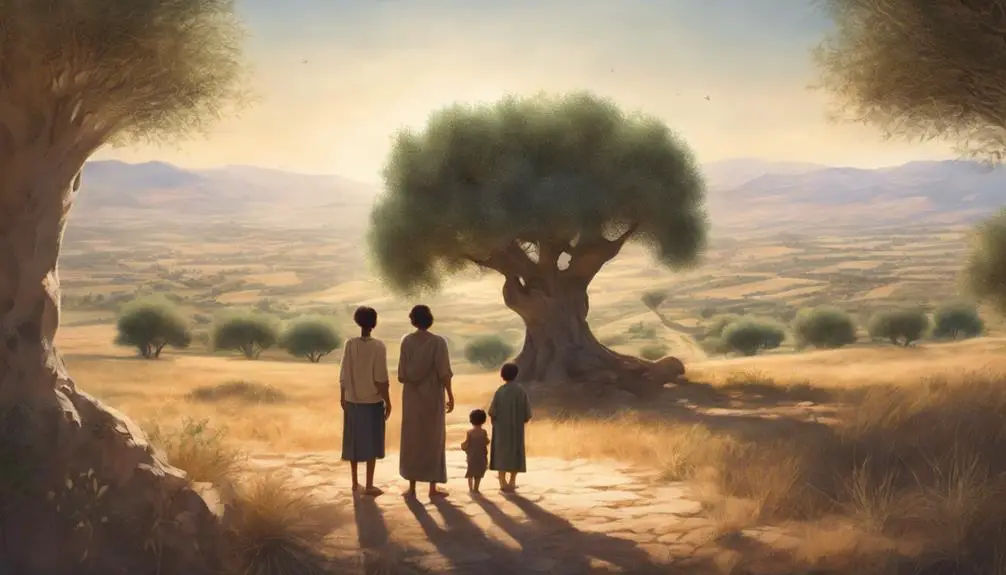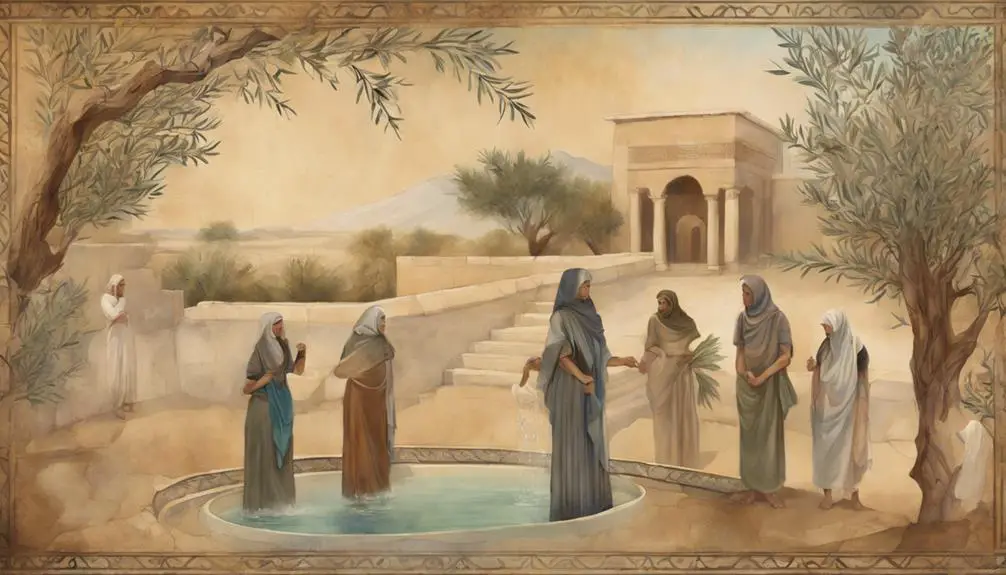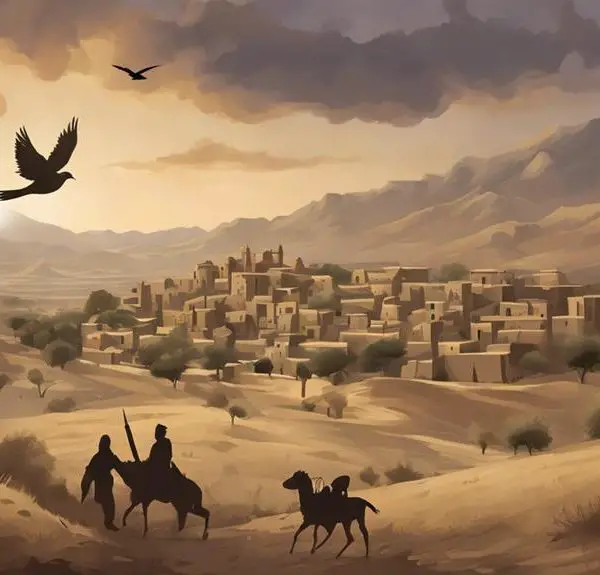Hidden in biblical texts, Aksah's tale of audacity and inheritance challenges perceptions of women's roles in ancient narratives.

Aksah in the Bible
As you wander through the tapestry of biblical narratives, you'll stumble upon Aksah, a figure whose story weaves a thread of audacity and insight into the fabric of ancient texts.
Her tale, marked by a bold request and a gift of land, serves as a window into the complexities of women's roles and inheritances in biblical times.
Aksah's legacy, often overshadowed by more prominent figures, offers a unique lens through which to view the interplay of gender, power, and faith.
Uncover the layers of her story, and you might find yourself questioning and reevaluating long-held perceptions of biblical women and their contributions to their societies.
Key Takeaways
- Aksah's negotiation for land ownership highlights her assertiveness in a male-dominated society.
- Her marriage to Othniel illustrates the strategic importance of marital alliances in ancient times.
- Aksah's story challenges traditional views on femininity and prompts reevaluation of women's roles in biblical narratives.
- Through her actions, Aksah provides insight into the complex dynamics of gender, power, and property rights in historical contexts.
The Heritage of Aksah

Aksah's heritage, deeply rooted in ancient Israelite history, plays a pivotal role in understanding her significance within biblical narratives. Her lineage, descending from Caleb, one of the two spies (alongside Joshua) who advocated for the Israelite invasion of Canaan, underscores her connection to pivotal moments in Israel's formative years. This lineage isn't merely a genealogical footnote; it situates Aksah within a framework of religious and cultural importance that spans generations, highlighting her as a figure of considerable status within her community.
Furthermore, marital alliances, a common strategy for consolidating power and forging political connections in ancient societies, feature prominently in Aksah's story. Her marriage to Othniel, Caleb's younger brother or kinsman (interpretations vary), isn't just a familial union but a strategic alliance that reinforces the internal cohesion among the Israelite tribes during a period of conquest and settlement. This alliance, born out of a promise by Caleb to give his daughter in marriage to whoever conquered Kiriath-sepher, emphasizes the role of women in cementing political and tribal relations, thereby contributing to the stability and expansion of early Israelite society.
A Bold Request
In a striking act of assertiveness, Aksah made a bold request of her father, Caleb, that reveals much about the dynamics of power and gender in ancient Israelite society. This move not only highlights her as one of the assertive women of her time but also showcases the negotiation tactics employed in familial and societal contexts.
- Assertiveness in Action: Unlike many women of her era, Aksah didn't shy away from directly approaching her father with a specific request. This assertive behavior was noteworthy in a society where women's roles were often circumscribed by patriarchal norms.
- Negotiation Tactics: Aksah's approach to her father wasn't merely a request but a negotiation. She presented her case in a manner that was both respectful and direct, embodying negotiation tactics that are studied and revered in modern contexts.
- Impact on Society: Aksah's bold request serves as an early example of women exercising agency within their limited spheres of influence. It challenges contemporary notions of passive femininity and provides a nuanced understanding of gender dynamics in ancient Israelite society.
Aksah's story is a testament to the complexity of power, gender, and negotiation in ancient times, providing valuable insights into the roles of assertive women.
The Gift of Land

Building on her assertiveness, Aksah then secured a significant gift from her father, Caleb: a piece of land, a request that underscores the economic dimensions of power and gender in ancient Israelite society. This event is pivotal, not just as a personal achievement for Aksah but also as a reflection of broader themes in biblical narratives, such as land distribution and Divine promises.
Aspect |
Description |
Impact on Society |
|---|---|---|
Economic Status |
Ownership of land increased Aksah's status. |
Highlighted wealth disparities. |
Gender Dynamics |
A woman's direct request was uncommon. |
Challenged traditional roles. |
Divine Promises |
Land was often seen as a fulfillment of these. |
Reinforced faith in these promises. |
Social Structure |
Land ownership was central to social status. |
Cemented the importance of land. |
Power Relations |
Aksah's negotiation showed nuanced power play. |
Showed women could wield power. |
This act of land acquisition by Aksah not only highlights her assertiveness but also provides insight into the complexities of land distribution within ancient Israelite society. It underscores the intertwined nature of land, power, and gender, and how these elements played a crucial role in shaping the social and economic landscape of the time.
Aksah's Legacy
While securing a piece of land may have been a personal victory for her, it's crucial to examine how this act has left an enduring legacy that continues to influence discussions on gender and property rights in ancient texts. Aksah's story isn't just a narrative from the past; it serves as a pivotal point for understanding the dynamics of women's rights and inheritance in historical contexts. Her legacy can be analyzed through several lenses:
- Cultural Interpretations: Aksah's story has been interpreted in various ways across different cultures, reflecting societal views on women's autonomy and rights. These interpretations offer insights into how ancient societies perceived gender roles and the rights of women to own property.
- Genealogical Significance: Her narrative also holds genealogical importance. It underscores the recognition of women in genealogies, which were predominantly male-centric. This inclusion not only highlights her significance but also marks a departure from the usual genealogical records of the time.
- Influence on Modern Discussions: Aksah's story continues to inspire contemporary debates on gender equality, especially in the context of property rights. Her assertiveness in securing land rights resonates with ongoing discussions about women's autonomy and their roles in society.
In analyzing Aksah's legacy, it's evident that her story transcends its biblical origins, offering valuable perspectives on gender roles and rights across times.
Insights on Women's Roles

Exploring Aksah's narrative offers profound insights into the evolving roles of women within biblical and historical contexts, shedding light on the complexities of gender dynamics and societal expectations. Her story, though seemingly a minor detail in the grand biblical narrative, is a significant marker of the shifting perceptions towards women's roles and their agency in navigating gender expectations.
You'll find that Aksah's request for land from her father not only underscores her assertive nature but also highlights the nuanced interplay between societal norms and individual agency. This act, though framed within a patriarchal structure, subtly challenges the rigid gender expectations of her time. It's a testament to the fact that women in biblical times weren't merely passive figures but were capable of asserting their desires and influencing decisions.
Moreover, Aksah's narrative invites you to reconsider the traditional interpretations of women's roles in ancient societies. It suggests that, despite the dominant patriarchal norms, there were instances where women could exercise a degree of autonomy and influence. This realization prompts a reevaluation of gender expectations, encouraging a deeper understanding of the complexity and diversity of women's experiences in historical contexts.
Frequently Asked Questions
How Does Aksah's Story Compare to Other Biblical Narratives Involving Women?
You're diving into how stories of women in biblical narratives unfold, particularly focusing on gender roles and marriage customs.
Unlike some tales where women's voices are secondary, Aksah's story stands out for her assertiveness in securing a blessing from her father. This contrasts with narratives where women are more passive or defined solely by their relationships to men.
Her proactive role showcases a nuanced understanding of women's positions and rights in biblical times.
What Are the Archaeological Findings That Might Support the Historical Existence of Aksah?
When you dig into the layers of history, you uncover pieces of the past that shine light on stories long told.
The archaeological findings related to Aksah's lineage and geographic context are sparse but intriguing. They provide a tangible link to the narratives that have been passed down through generations.
How Has Aksah's Story Been Interpreted and Represented in Various Cultures and Religions Outside of Judaism and Christianity?
You'll find Aksah's story has sparked diverse cultural interpretations and religious adaptations beyond Judaism and Christianity. Analyzing these narratives, it's evident that her tale resonates across various traditions, each sculpting its unique perspective.
This broad spectrum of interpretations not only enriches the understanding of her story but also highlights the universal appeal of certain themes, regardless of the original context. Such cross-cultural engagement offers a rich field for scholarly analysis and understanding.
Are There Any Notable Artworks, Literature, or Media That Have Been Inspired by the Story of Aksah?
You're diving into a sea of creativity, where Aksah's portrayals ripple across modern adaptations.
Notable artworks, literature, and media have been inspired by this narrative, showcasing its versatility and timelessness.
These interpretations reveal the layers of meaning that have resonated across cultures and epochs.
Analyzing these creative expressions, you'll find a scholarly treasure trove that reflects how ancient stories continue to inspire and inform contemporary artistic endeavors.
How Do Modern Feminist Theologians View Aksah's Story in the Context of Gender Dynamics and Empowerment in the Bible?
You'll find that modern feminist theologians scrutinize gender representation in religious texts, seeking empowerment narratives. They apply a feminist critique to stories like Aksah's, focusing on how her tale challenges or reinforces traditional gender dynamics.
Their analysis often highlights areas where biblical narratives can offer insights into gender equity or, conversely, where they perpetuate patriarchal norms. This perspective opens up discussions about the role of women in religious histories and texts.
Conclusion
Interestingly, Aksah's story, nestled within ancient texts, unfolds an ironic narrative. Here lies a woman, often overlooked, whose bold request not only secures her a significant inheritance but also subtly challenges the patriarchal norms of her time.
Through this lens, Aksah's legacy isn't just about the land she acquired; it's about the boundaries she transcended. Analyzing her story offers a profound insight into the evolving roles of women, showcasing their agency in a world presumed to silence them.



Sign up